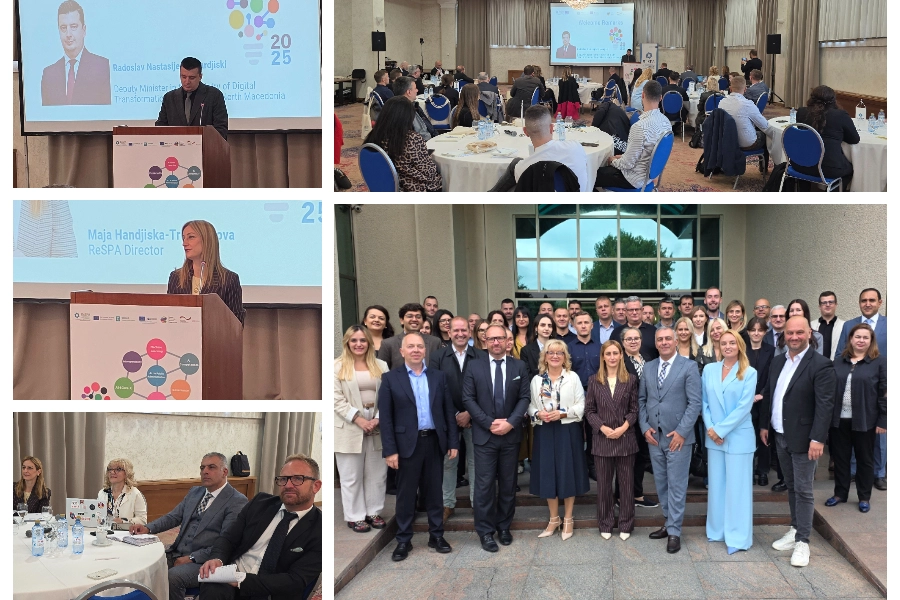
AI and Machine Learning for Better Governance: Seasonal School Sparks Digital Transformation in the EU Candidate Countries
29 September – 2 October 2025, Skopje, North Macedonia
ReSPA’s Seasonal School on Digital Transformation 2025, organised in partnership with the SIGMA Programme and the GIZ Regional Project ‘Public Administration Reform in the Eastern Partnership Countries’, tackled a timely theme: “Artificial Intelligence & Machine Learning for Public Administration.”
What made the School especially impactful was its direct connection to the Western Balkan Digital Summit 2025, ensuring that the insights and outcomes feed directly into wider regional and European digital agendas.
The School’s overarching mission is clear: to help Western Balkans and this year Eastern Partnership governments strengthen public administration reform, digital transformation, and good governance in line with EU standards. By joining forces with SIGMA and GIZ, ReSPA this year reinforced a shared commitment to governance, transparency, and capacity-building across the region.
Over three days, the programme brought together 40+ senior public officials from 10 administrations, 30+ experts, and practitioners to build the knowledge, skills, and strategic foresight needed to navigate the fast-evolving AI landscape. With a mix of conceptual sessions, hands-on practices, ethical debates, policy deep dives, and peer learning, the Seasonal School created a dynamic space where participants not only learned about AI but also explored how to adopt it responsibly, inclusively, and for the benefit of citizens.
Day 1 – Foundations and policy landscape of AI in the public sector
The programme opened with remarks by Radoslav Nastasijevikj Vardjiski (Deputy Minister, Ministry of Digital Transformation of North Macedonia), who underlined: “The theme of this year’s school, “Artificial Intelligence and Machine Learning for Public Administration,” is of exceptional importance at this moment. We are witnessing the power of artificial intelligence, which is already manifesting on a global scale. Governments are using AI to provide faster, more efficient, and more personalised public services. From automating administrative processes to supporting policy-making and enhancing transparency, artificial intelligence has the potential to radically transform the way the state serves its citizens. Yet, with these opportunities comes responsibility. AI raises critical questions about ethics, transparency, accountability, and trust. Citizens will embrace digital public services only if they believe that digitalisation functions fairly, inclusively, and respects their rights.
We view digital transformation as a strategic investment in the future of our society. Our goal is clear: citizens must be at the center of digital transformation. Every new technology we adopt must strengthen trust in institutions, improve the quality of services, and create equal opportunities for all”
Director Handjiska Trendafilova underlined: "This year’s Seasonal School is a milestone in regional and inter-regional cooperation, organized by ReSPA together with the SIGMA Programme, the GIZ Regional Project on Public Administration Reform in the Eastern Partnership Countries, the Croatian School of Public Administration, UNESCO, the OECD, and our partners from the AI4Gov-X Project, alongside distinguished experts. Together, we continue our tradition of fostering learning, exchange, and innovation across the Western Balkans and beyond."
Oscar Corso (ReSPA Expert) delivered the keynote, presenting a regional outlook on AI in the Western Balkans and EaP, in cooperation with SIGMA and GIZ. The first sessions introduced AI in Public Service Delivery, led by Vedran Antoljak (AI Business Advisor), who showcased practical cases and structured approaches. Olha Krevska from the Ministry of Digital Transformation of Ukraine contributed insights from its reform experience.
Further discussions included the AI policy landscape in Europe (Oscar Corso), the SMART REGUL(AI)TE initiative (Vedran Antoljak), and Ethical and Trustworthy AI Frameworks (Prateek Sibal, UNESCO). Marija Grga (Croatian School of Public Administration, online) presented the AI Index in Public Administration.
The day concluded with an interactive panel moderated by Goran Pastrovic (AI4Gov-X), exploring institutional readiness for AI in governance, leadership, and capacity-building.
Day 2 – Practical implementation, skills development, and institutional readiness for AI adoption in the public sector
Vedran Antoljak introduced the idea of an AI Academy for Public Servants, followed by Prateek Sibal (UNESCO/Oxford University), who highlighted AI Skills and Competency Frameworks. Maksim Ovtšinnikov (DG Nation, online) delivered a session on Data Governance & Interoperability, addressing lifecycle management and open data strategies.
Miodrag Vujkovic facilitated a session on AI as Public Infrastructure, emphasising inclusivity, GDPR compliance, and examples like the UAE’s national AI offering. He also led a hands-on no-code AI workshop, where participants experimented with datasets relevant to public administration.
An OECD online presentation on “Governing with Artificial Intelligence” provided global perspectives, followed by a Peer Exchange and Action Planning session, where institutions committed to next steps and identified opportunities for regional collaboration.
Day 3 – Strategic AI Governance in the Public Sector
Marzia Mortati (AI4Gov-X) introduced the AI4Gov-X Project, while Helen Tueni (AI4Gov-X Partner) presented a roadmap for Strategic AI Governance in the Public Sector.
Art Alishani (Johan Skytte Institute of Political Studies, Tartu) delivered a session on the EU AI Act and Legal Foundations, addressing intersections with GDPR and ethical obligations, complemented by the concept of the AI Factory.
The National Alignment session explored how administrations are tackling harmonization with EU frameworks, surfacing good practices and challenges. Closing remarks underlined the importance of regional collaboration and institutional commitments.
Day 4 – Participants joined the Western Balkan Digital Summit 2025, gaining exposure to regional and international perspectives on AI and digital governance. The Summit provided a unique platform to connect the School’s outcomes with broader policy debates and to ensure alignment with regional and European agendas.
Closing the event, Bojana Bajić, underlined: “The Seasonal School on Digital Transformation, with a focus on artificial intelligence, is essential as it enables public servants to approach the topic from multiple angles, policy, technology, ethics, and skills. it provided Western Balkan and EaP officials with the skills, frameworks, and collaborative environment to responsibly harness AI, ensuring that digital transformation remains citizen-centric, inclusive, and aligned with European standards. By linking the Seasonal School directly with the Western Balkan Digital Summit 2025, the initiative ensured that its outcomes will be both informed by and amplified through broader regional digital agendas and policy dialogues.”



